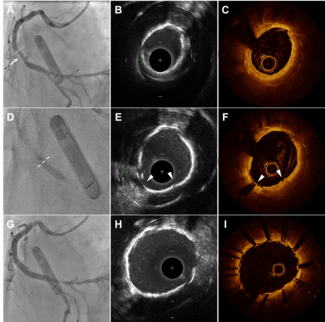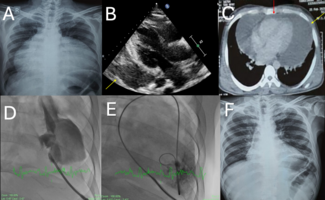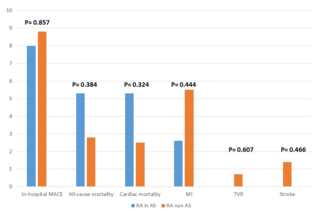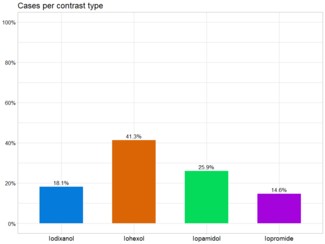Percutaneous Transcatheter Balloon Valvuloplasty for Bioprosthetic Tricuspid Valve Stenosis in a patient With Orthotopic Heart Transplant
Abstract: A 47-year-old man with history of familial cardiomyopathy and orthotopic heart transplant at the age of 34 years presented severe tricuspid stenosis (TS) with a mean transvalvular gradient of 10 mm Hg. The patient opted against tricuspid valve replacement and was offered percutaneous transcatheter tricuspid balloon valvuloplasty (PTTBV). To the best of our knowledge, this is the first report of a PTTBV in an orthotopic allograft, and demonstrates excellent clinical outcome at 1 year.
J INVASIVE CARDIOL 2015;27(3):E37-E39
Key words: percutaneous transcatheter balloon valvuloplasty, tricuspid valve stenosis, orthotopic heart transplant
_____________________________
Case Report
A 47-year-old man presented with dyspnea on exertion, leg edema, and exertional presyncope. He had a history of a familial cardiomyopathy and underwent orthotopic heart transplant (OHT) at the age of 34 years. Post transplant, he had moderate-severe tricuspid regurgitation, which improved to mild-moderate on discharge. Four years later, he underwent tricuspid valve replacement with a Carpentier-Edwards  bioprosthesis for progressive severe tricuspid valve regurgitation possibly related to repeated endomyocardial biopsies.
bioprosthesis for progressive severe tricuspid valve regurgitation possibly related to repeated endomyocardial biopsies.
The patient did well for the next 7 years until he subsequently developed New York Heart Association class III symptoms. Physical examination was notable for jugular venous distension and peripheral edema. Transthoracic echocardiography revealed severe tricuspid stenosis (TS) with a mean transvalvular gradient of 10 mm Hg. Tricuspid valve replacement was considered. He opted against it, as this would have been his fourth sternotomy; the patient was then was offered percutaneous transcatheter tricuspid balloon valvuloplasty (PTTBV). Right heart catheterization revealed a mean gradient of 9 mm Hg between right atrium and right ventricle, consistent with severe TS. Post balloon valvuloplasty, the mean gradient decreased to 4 mm Hg. The patient reported no further limiting exertional symptoms. To the best of our knowledge, this is the first report of a PTTBV in an orthotopic allograft, and demonstrates excellent clinical outcome at 1 year.
Discussion
Tricuspid valve surgery is recommended for patients with isolated, symptomatic severe TS, although PTTBV might be considered in the absence of tricuspid regurgitation.1 Reoperative sternotomy after OHT is technically challenging, requires more blood product transfusions, and is associated with increased morbidity and mortality.2 The data on PTTBV of bioprosthetic valves is more limited still and is derived from favorable case reports, suggesting that PTTBV may provide a reasonable option for patients who are at high risk for surgical valve replacement. Alternatively, an off-label placement of a transcatheter bioprosthesis may be considered.3
References
- Nishimura RA, Otto CM, Bonow RO, et al; American College of Cardiology/American Heart Association Task Force on Practice Guidelines. 2014 AHA/ACC guideline for the management of patients with valvular heart disease. J Am Coll Cardiol. 2014;63(22):2438-2488. Epub 2014 Mar 3.
- George TJ, Beaty CA, Ewald GA, et al. Reoperative sternotomy is associated with increased mortality after heart transplantation. Ann Thorac Surg. 2012;94(6):2025-2032. Epub 2012 Sep 7.
- Daneault B, Williams MR, Leon MB, Paradis J, Kodali SK. Transcatheter tricuspid valve-in-valve replacement resulting in 4 different prosthetic heart valves in a single patient. J Am Coll Cardiol. 2013;61(2):e3.
_____________________________
From the University of Massachusetts Medical School, Department of Medicine, Division of Cardiology, Worcester, Massachusetts.
Disclosure: The authors have completed and returned the ICMJE Form for Disclosure of Potential Conflicts of Interest. The authors report no conflicts of interest regarding the content herein.
Manuscript submitted May 15, 2014, final version accepted June 30, 2014.
Address for correspondence: Nikolaos Kakouros, MBBS, MRCP, PhD, Division of Cardiology, University of Massachusetts Medical School, 55 Lake Avenue North, Worcester, MA 01655. Email: Nikolaos.Kakouros@umassmed.edu


















